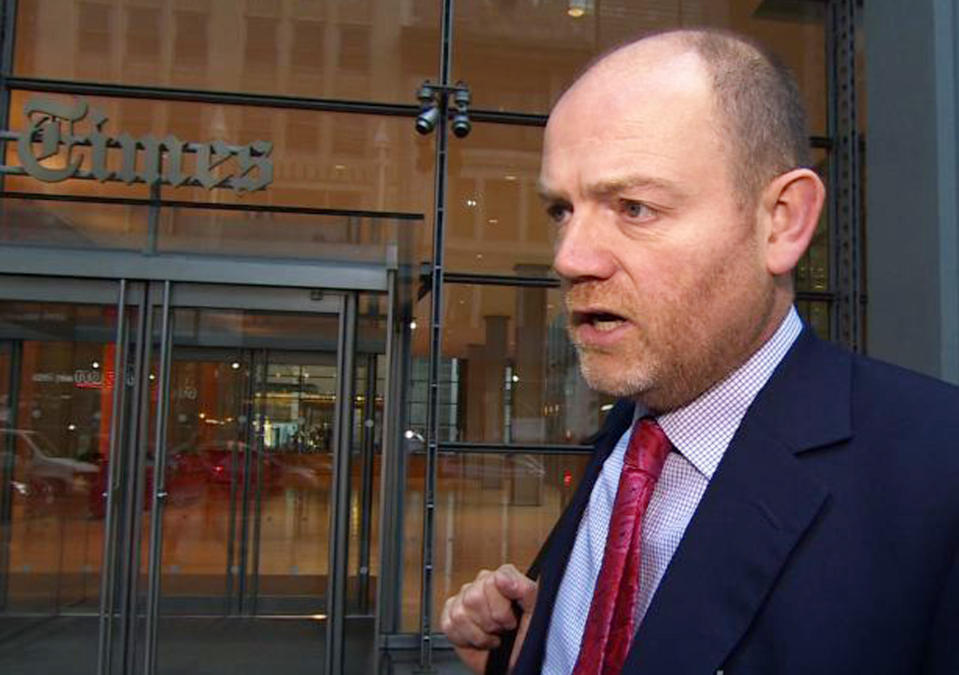Thompson starts as NY Times CEO amid BBC scandal
NEW YORK (AP) — New York Times Co. CEO Mark Thompson started his job Monday amid a widening scandal at his former employer, the BBC.
When the Times hired him in August, Thompson was hailed as someone who could help the company at a time when print publications are suffering from the loss of readers and advertisers.
Thompson, 55, left the British Broadcasting Corp. in September after more than three decades with the public broadcaster. He joined the company as a production trainee in 1979 and spent his last eight years there as director general.
In recent months, Thompson has faced questions over a decision by the BBC's "Newsnight" program last December to shelve an investigation into child sexual-abuse allegations against renowned BBC children's television host Jimmy Savile. That decision was made while Thompson was still in charge of the company.
Thompson has said he only became aware of the investigative report after speaking with a BBC journalist at a cocktail party long after it had been canceled. When he inquired later about its cancellation, he said executives told him it had been terminated for journalistic reasons.
Conservative lawmaker Rob Wilson told The Associated Press last month that he has written Thompson seeking more answers.
Savile, who died in October 2011, was known for his eccentricity, garish tracksuits and Cuban cigars. Early last month, BBC rival ITV aired a documentary that detailed sexual abuse allegations against Savile. Since then, scores of women have come forward, alleging that they were abused by Savile when they were underage girls, sometimes in BBC dressing rooms. Savile's behavior was the subject of speculation long before that, but it was never formally investigated by the BBC.
In the latest twist, Thompson's successor as the BBC's top executive, George Entwistle, resigned on Saturday after a Nov. 2 "Newsnight" report wrongly implied that a former British politician sexually abused a child.
After the Savile scandal broke, Times Chairman Arthur Sulzberger Jr. sent the company's staff a letter that said he was satisfied Thompson had no role in the decision to scrap the investigative segment on Savile.
The Times Co. did not make Thompson available for interviews on Monday. A spokesman said he spent his first day on the job meeting with employees and learning the company.
In a memo to staff on Monday, Sulzberger welcomed Thompson and said his experience "will be of great value to our company." He did not mention the BBC scandal.
"Mark will lead us as we continue our digital transformation, bolster our international growth, drive our productivity and introduce new technologies that will help us become better storytellers and enrich the experience for our readers and viewers," Sulzberger wrote. "That is what he did as Director-General of the BBC."
Thompson oversaw job and pension cuts while expanding the BBC's reach overseas and on the Web. It now reaches a global audience of 166 million people every week. The mix of cuts and online growth Thompson pursued at the BBC is a strategy the Times is interested in replicating. It has shed assets, paid down debt and launched a China-based website in recent months. Thompson was seen as the right man to take the company forward following the hasty exit of CEO Janet Robinson in December.
Thompson is the first foreigner to run the Times since its founding in 1851.
He faces big challenges at the Times. Its union votes on a new contract this week after prolonged negotiations. And despite sitting on $1 billion in cash following the sale of About.com in September, its core business eroded in the last quarter. Its net profit from July through September fell 85 percent to $2.3 million, even as the number of digital subscribers increased. Investors are calling for a dividend even as print advertising revenue spirals downward.
Stopped on the sidewalk on his way into the Times' Manhattan headquarters early Monday, Thompson was asked by a reporter from Britain's ITV News about the latest BBC development — the resignation of his successor, Entwistle.
Thompson said that he was "saddened by recent events at the BBC," but that it had no bearing on his new job.
"I believe that it will not in any way affect my job," he said.
The Times' own journalists have criticized its coverage of the BBC scandal, but it has published multiple stories about it.
Times columnist Joe Nocera asked in an Oct. 29 piece whether Thompson is "the right man for the job" and noted the ongoing investigation of Savile may distract him as the newspaper company's CEO.
"Since early October, all anybody has asked about Thompson are those two most damning of questions: what did he know, and when did he know it?" Nocera wrote.
The newspaper's public editor, Margaret Sullivan, had called on the company to pursue the story relentlessly, before she concluded in a blog post on Monday that "The Times has pulled no punches in reporting."
But as the BBC scandal has widened, media watchers such as news industry analyst Ken Doctor said Thompson should step aside "for the good of the Times."
Doctor, an analyst with Outsell, a global research and advisory firm, said there are "lingering questions about the extent that Thompson knew about the allegations."
"It's a major distraction for The New York Times, when The New York Times is in a huge transition mode for itself," Doctor said.
__
Nakashima reported from Los Angeles. AP Business Writer Tom Murphy in Indianapolis and AP Writer Cassandra Vinograd in London contributed to this story.



